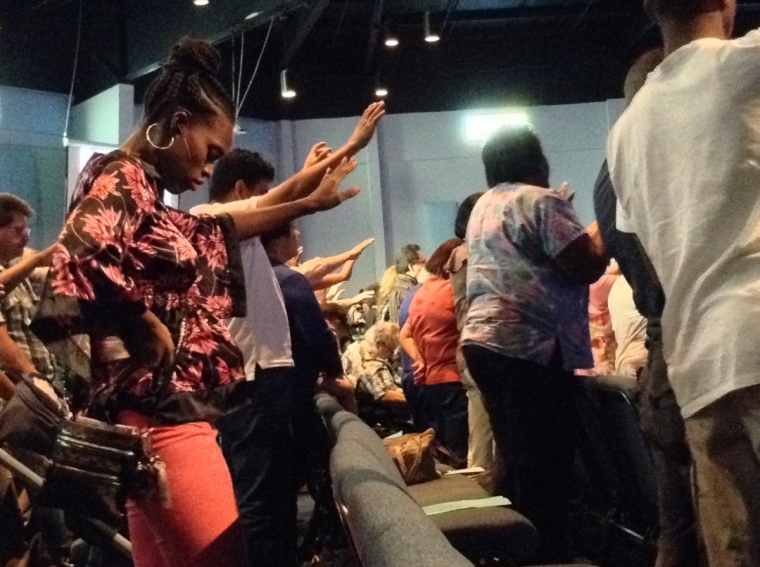Christians as peacemakers in troubled times: 'You gotta figure out who your people are'

Dallas / Louisville (Christian Examiner) — While pundits call for political solutions to race relations, several Baptist colleges are enlisting students and partnering ministries to find long-lasting solutions.
"Our objective is not to be color blind," the new president of Dallas Baptist University said, but to "embrace the diversity of the family of God" and recognize sin as the problem society must address.
Adam C. Wright, the freshly installed DBU president, is well aware that Christians are in a much better position to offer the Gospel as the only answer to a sin problem. He called on believers to "persevere as peacemakers under the banner of the cross" during a pep talk for the school's community partners.
Expressing his grief at the killing of five Dallas policemen, Wright July 11 told a lunch gathering, "The problem is that we do not more appropriately reflect the Imago Dei, the image of God. If we did, we would be just as incensed against Ferguson, against Charleston and Minnesota as we are about Dallas."
Drawing lessons from effective social justice activists like William Wilberforce, the British statesman who fought for the end of the slave trade and slavery, and civil rights leader Martin Luther King, Jr., Wright said, "God is our refuge and strength, a very present help in times of trouble. Do not give up."
Perseverance in peacemaking has been the challenge that Wayland Baptist University senior Clara Baxter embraced after relocating from Texas to Kentucky to live in the inner city this summer serving with the Christian social justice organization Love Thy Neighborhood.
Peacemaking began with introducing herself to neighbors and sharing freshly baked cookies. She found residents to be friendly in the area near Sojourn Community Church.
"People were kind," Baxter told Christian Examiner. "The worst that happened was that some people didn't open their doors," Baxter said.
The simple act of kindness led to broader conversations and developing relationships, including a fledgling friendship with Stacy, a 30-year resident of the neighborhood. Stacy warned the women not to settle there and described local problems of drug use and prostitution.
Are you "missionaries or something?" Stacy asked as they explained their work with LTN, a partner of Louisville's Sojourn Community Church.
"I don't go to church," Stacy immediately replied, describing her "bad experiences" with various congregations.
"I could understand why she wouldn't want to go," Baxter said. "This woman felt isolated by a community that is supposed to be just that — a community."
"She told us that she didn't talk to neighbors much and that she was glad we came by," Baxter said after leaving Stacy's home.
In the midst of giving her summer to be a peacemaker on behalf of a Christian ministry in Louisville, Baxter was dealing with "hurt and mourning" over the shootings that occurred in her home state of Texas.
"These events only show that the world needs the love of Christ constantly presented," confirming "that what we at LTN do is part of God's plan to love the world."
Richard Ellis would applaud Baxter's attempt at establishing community. "From the get-go, the intent [in founding Dallas' non-denominational Reunion Church] was to be very intentional about being diverse without making it the main thing."
Even the downtown location in the Dallas Convention Center theater encourages diversity. "Downtown is neutral territory and the convention center is neutral turf," Ellis said, adding with a laugh, "Plus you have so many shelters that are within walking distance of where we are meeting that we get bums to billionaires."
Reunion, with an average attendance of 600, is anything but a typical homogeneous white or black church.
"When you get a roomful of people who have nothing in common but Jesus...and there is no other explanation but that we are followers of Christ... then the world buys into what we're selling or giving away. And they go, 'You can't do this without God.' This might be an oversimplification, but it works for us," Ellis said.
Of peacemaking, Ellis advised, "Just shut up and listen. When you have a basic understanding of the situation, then it makes you more sensitive, possibly, to the plight of someone in that situation. You can't stop racism overnight. But if a black man thinks that somebody actually has a category for what he goes through ... it helps.
"[Racism] has been going on for hundreds of years," Ellis continued. "White people in particular act like they have no idea. I have many friends who get profiled. You can't understand people till you've been in their shoes. You won't get there, but at least you have a category. And if they think you really care enough ... then they feel a little better."
"Hopefully change is going to come. But change comes out of relationship," Ellis added.
On the Sunday following the Dallas shootings, Reunion held services as usual. When the microphones were passed around for people to share, a black woman in her thirties and a member of the worship team, raised her hand to talk, Ellis recalled.
"I woke up this morning," the woman said. "And in the flesh, my first thought was, I wanna go be with my people. And then I realized that you are my people and I came to church."
Ellis puts it more simply when advising Christians on how to be peacemakers. "You gotta figure out who your people are."
With reporting by DBU student Lauren Reynnells